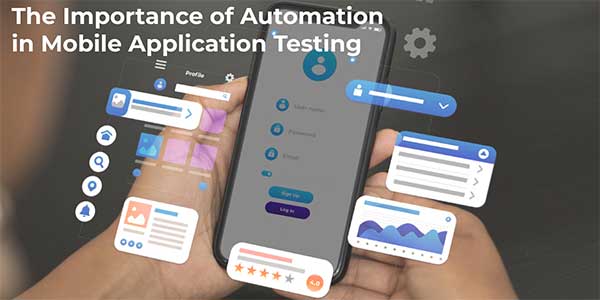
The 21st century, which has proved the internet is not just an accessory, has transformed the mobile application landscape into a different world and changed the way we witness the use of the internet.
In the era where mobile applications are rising in the industry, mobile app testing services are becoming mandatory to enhance usability, functionality, and customer engagement in developed mobile applications.
To increase productivity in mobile app testing, developers have introduced automatic testing processes apart from manual testing to perform the repetitive task processes in a faster, bug-free, and more secure way to expand the application’s functionality.
Table of Contents
What Is Automation Testing?
Automation testing is the process of testing mobile applications, where software testers use different test cases and increase test coverage with the help of automation testing tools and frameworks.
Automatic testing differs from manual testing in terms of execution time, repetitive tasks, finding flaws or errors, greater test coverage, and reduced human error to enhance the testing process.
The key components of automated testing frameworks are executing test script language, designing a test case, managing the test configuration, performing test data, finding errors, resting detailed reports on analysis, and integrating with CI/CD pipelines, leading to enhancing the testing process.
Benefits Of Automation In Mobile Application Testing:
Automation in Mobile App Testing Services has several benefits to the testing process, such as:
Increased Efficiency:
The automatic testing process increases the efficiency of mobile application testing in a faster way. With the help of different tools, the test cases are quickly examined in each stage of the testing process to detect errors and provide a detailed report to the testers so they can execute the codes in less time.
Due to the faster execution of test cases, more test coverages are performed in less time. Here comes the role of a mobile app testing company, where testers execute multiple programs for different mobile applications with the help of automatic testing tools.
Improved Accuracy:
Manual testing often causes lots of errors due to failure in repetitive tasks performed by human testers. So, these problems lead to the development of automatic testing tools that continuously execute the test cases in each stage of development to reduce human error in the manual testing process.
The automatic mobile app testing services maintain consistency in executing test cases throughout the entire testing process, from planning a test case design to launching the application to the end users.
Enhanced Coverage:
Automated regression testing helps to execute multiple test coverages over critical functionalities, multiple browsers, and several operating systems to be compatible with the existing features.
Automatic testing can be performed in multiple input conditions and provides in-depth analysis of complex test case scenarios by balancing the automated and manual test cases for better functioning in the testing process.
Cost-Effectiveness:
As automated tests are performed by different testing tools, these tools can perform different tasks in multiple environments without the need for human intervention. So, it reduces labor costs for human resources.
Writing test cases in a repetitive manner takes lots of time, especially for human testers. So, automated testing tools can help store the test cases and use them for different projects, saving lots of time and money for mobile app testing companies and developers.
Challenges In Automating Mobile Application Testing:
Some common challenges happen while incorporating automatic testing services such as:
Device And OS Fragmentation:
These are common challenges in mobile application testing services when multiple devices run a single app at a time, creating compatibility issues for the testers to ensure the application cannot be run on multiple operating systems such as Android, Mac OS, and others.
So, they create different versions of the applications that can run on multiple browsers, different screen sizes, and operating systems by uploading them to a cloud mobile app testing solution.
UI And Interaction Complexity:
Sometimes, it is difficult to maintain a perfect UI interaction in the automatic testing process. If the UI is optimized poorly by automated testing tools, then it impacts user experiences as the application cannot run properly on different screen sizes, leading to text wrapping, misalignment, and other interaction navigation impacts poor user satisfaction.
Integration With CI/CD:
If the implementation of the CI/CD pipeline with the automatic mobile app testing services is done wrongly, then some common challenges will occur, such as bad performance, poor team collaboration, difficulty in version control, and impacts on debugging errors, leading to inaccurate testing results.

Best Practices For Implementing Automation In Mobile App Testing:
A Mobile App Testing Company embraces the following best practices to successfully implement the test strategy.
- In the first phase, the company chooses the right testing tool that supports several testing types, versatile browsers, and cloud testing environments, has a good reporting analyzer, and supports different programming languages that can easily integrate with the existing systems to enhance user engagement.
- Secondly, you must maintain a stable testing environment to create multiple test cases that can be reused by testing tools for different projects in the long run. For successful implementation of mobile app testing, you should store the test cases in a separate repository, which can be used in different version control systems.
- Regular monitoring and updating of the apps’ features helps in coping with the new trends and technologies to meet the user expectations by regularly testing the applications even after launching to the end users.
Explore More On Mobile App Testing Today!
With the rise of smartphone devices, automated mobile app testing services will increase accordingly to meet the customers’ needs and be compatible with the trending technological advancements.
Although certain challenges may happen during the testing process, these situations can be overcome with the successful implementation of the testing strategy and best practices.
So, developers and testers need to incorporate automated mobile app testing along with manual testing services with the help of certain tools and frameworks to increase the functionality, security, and reliability of the developed application among users.

 About the Author:
About the Author:












Be the first to write a comment.